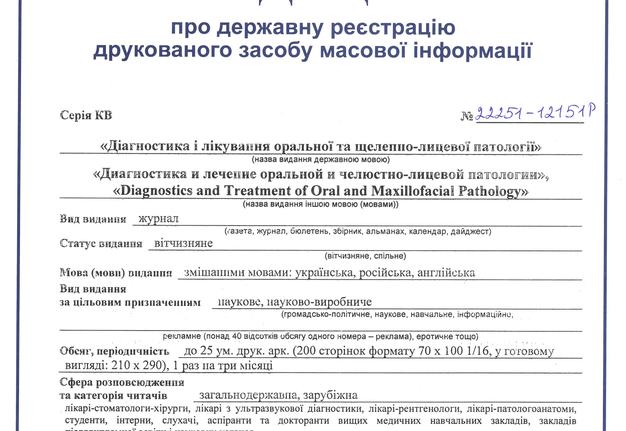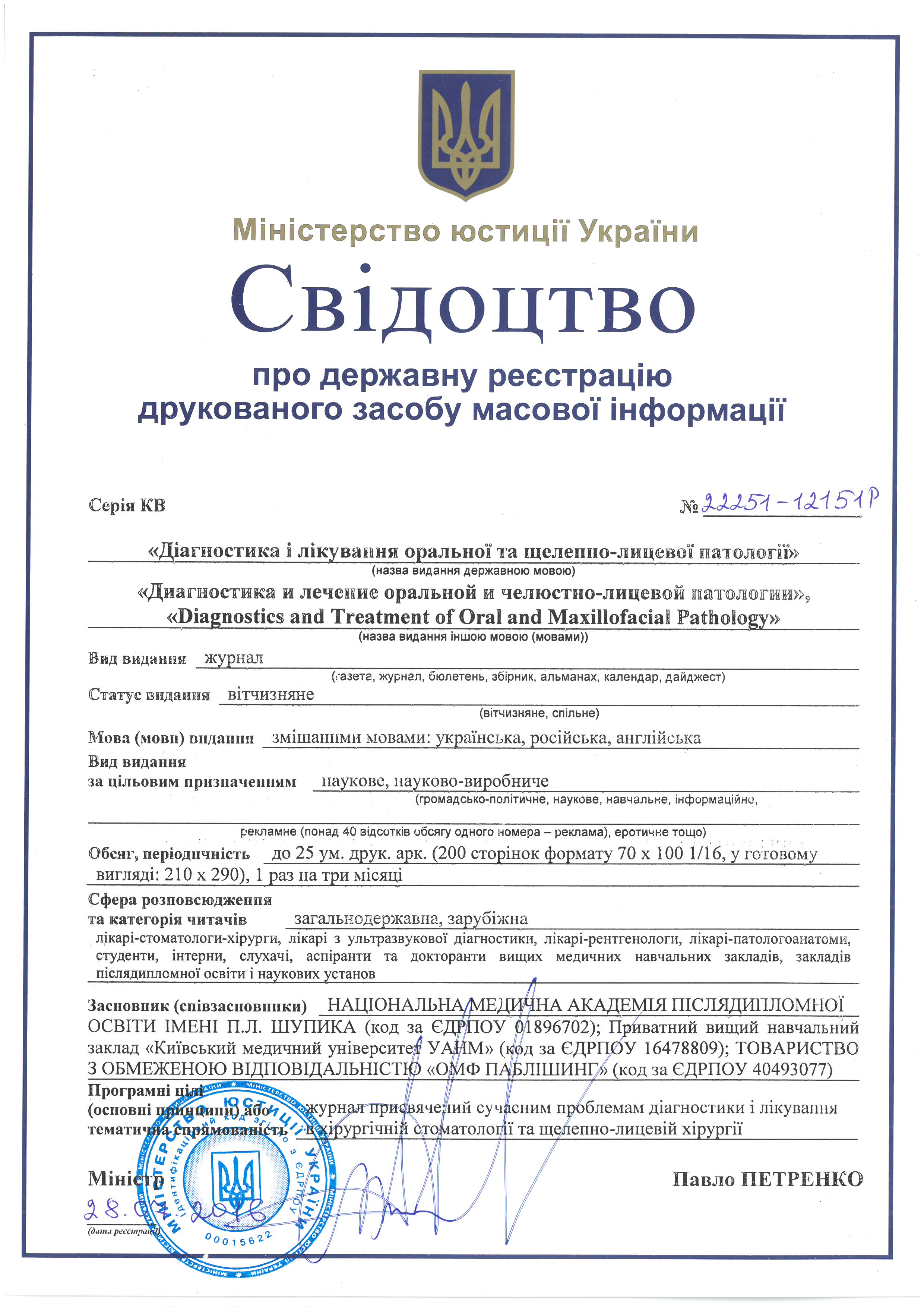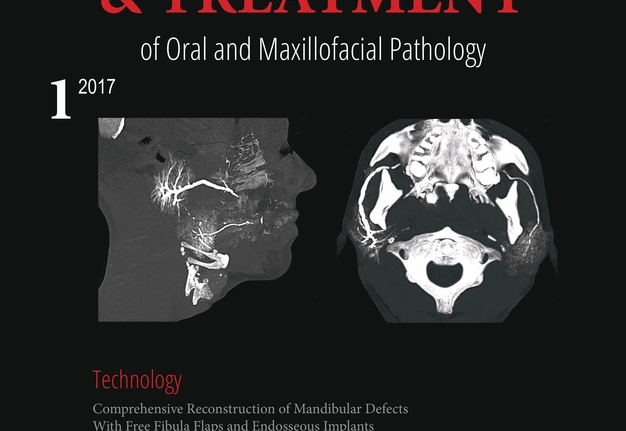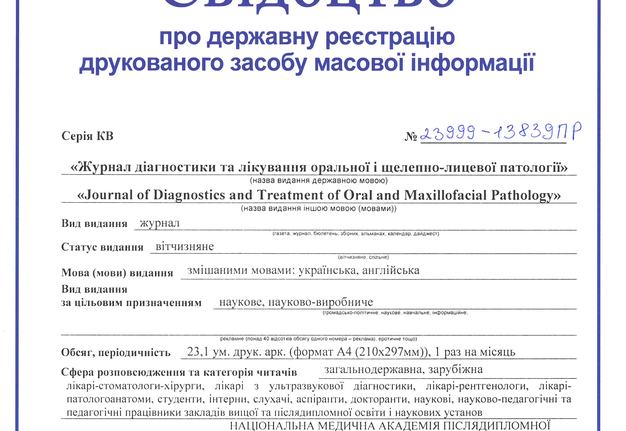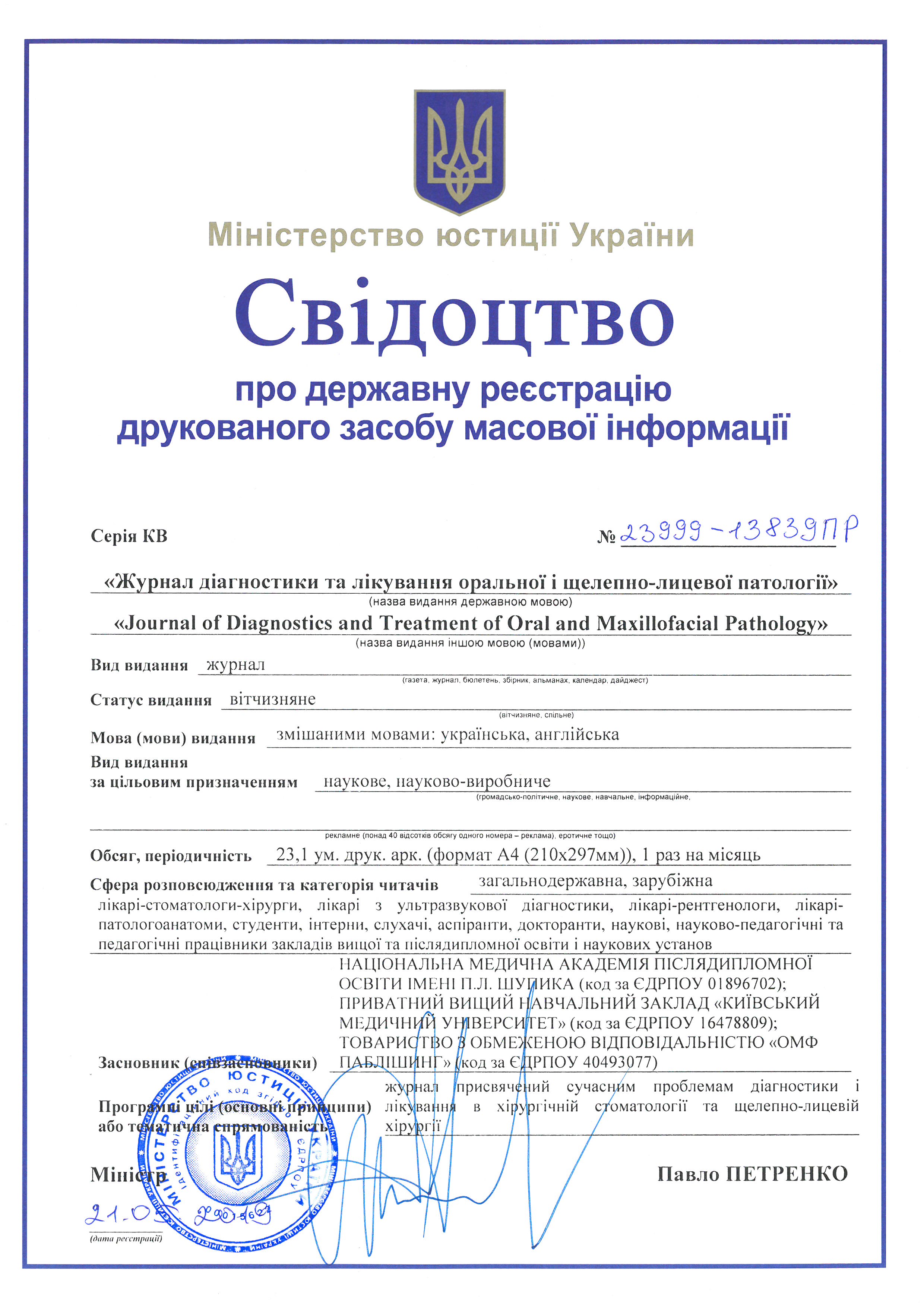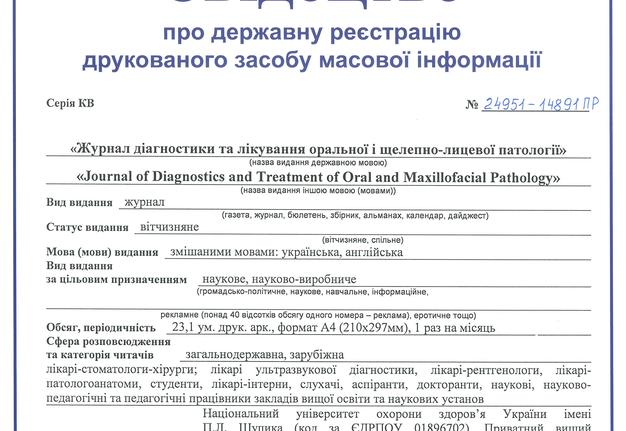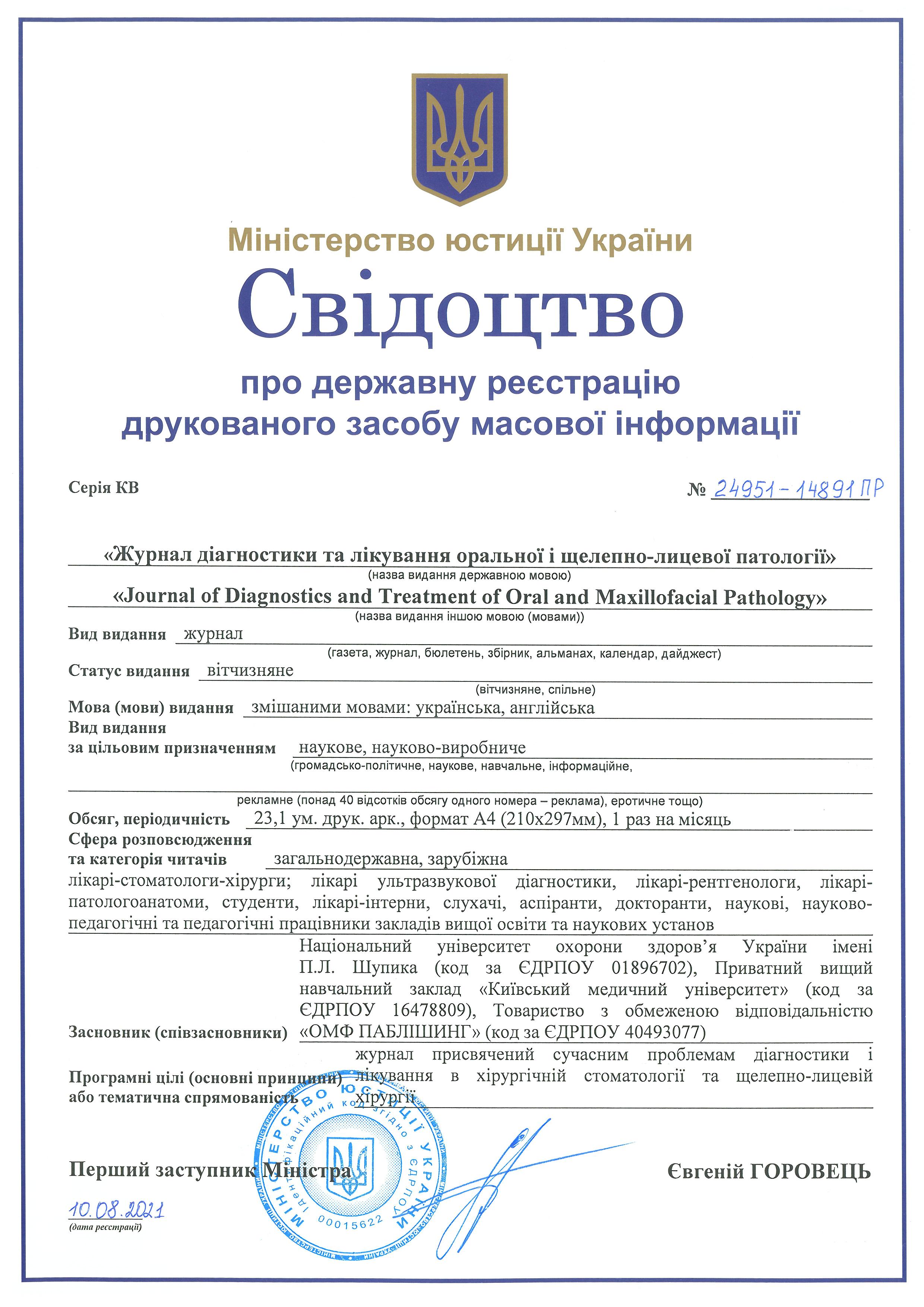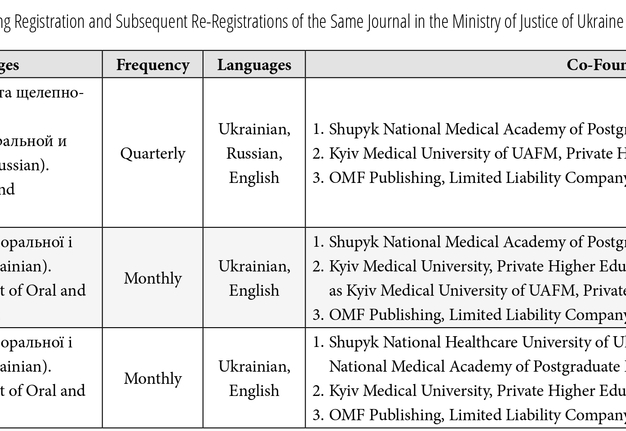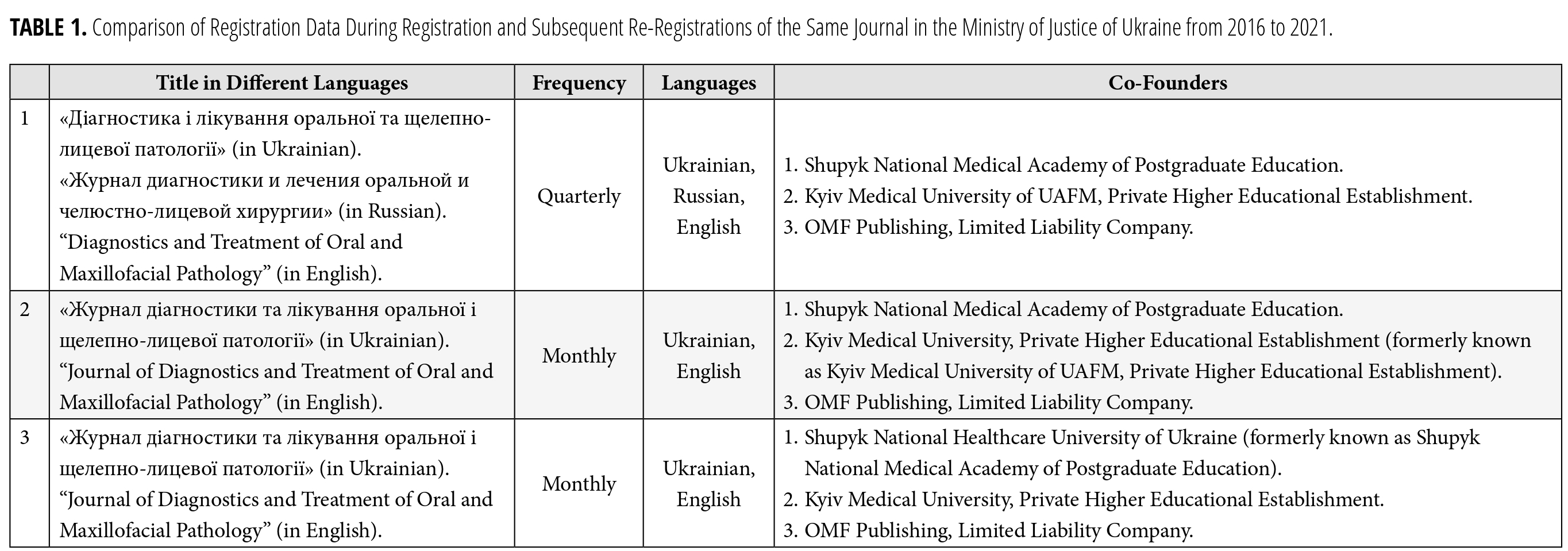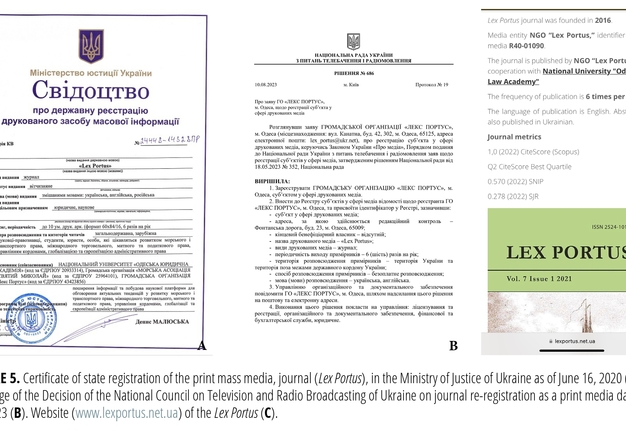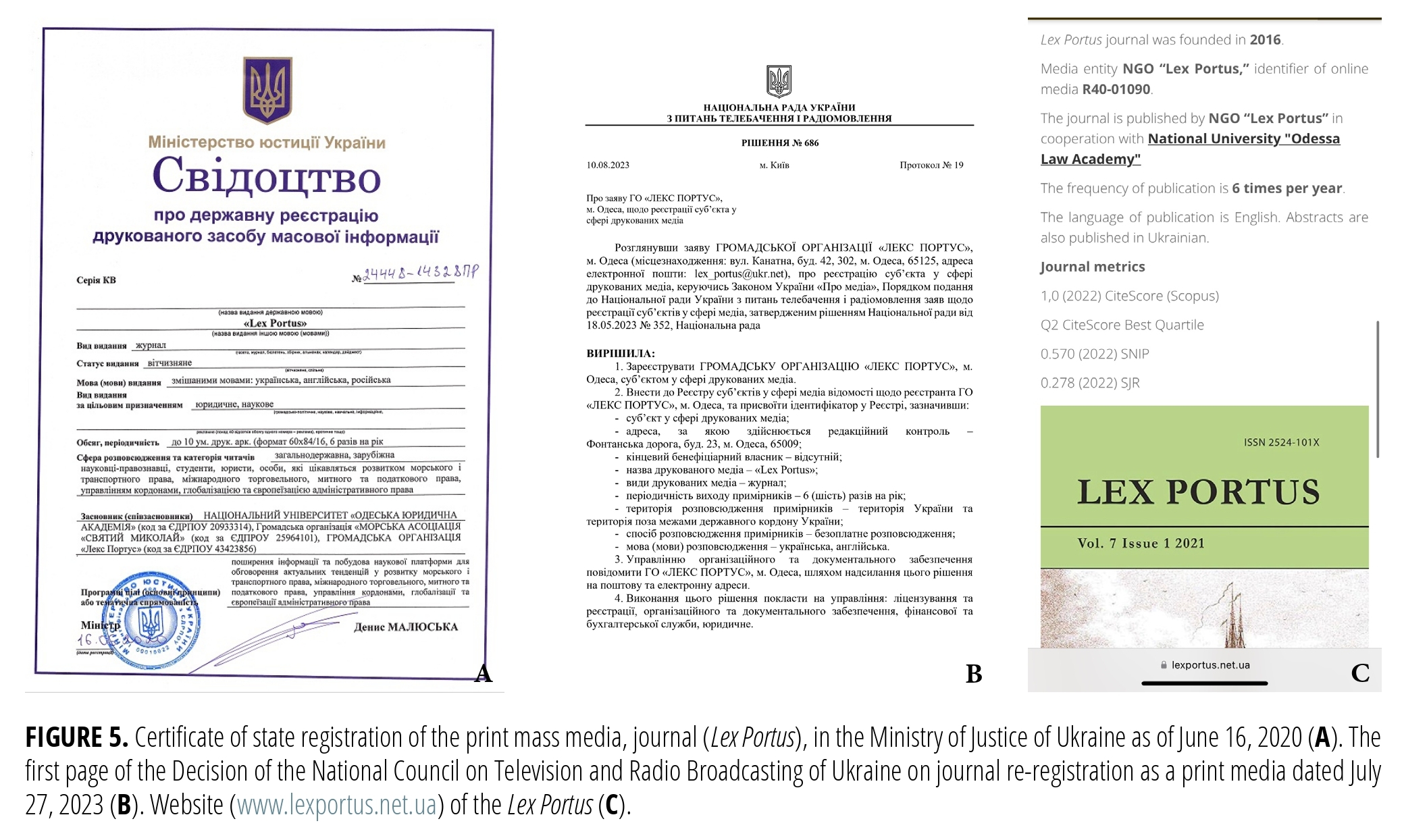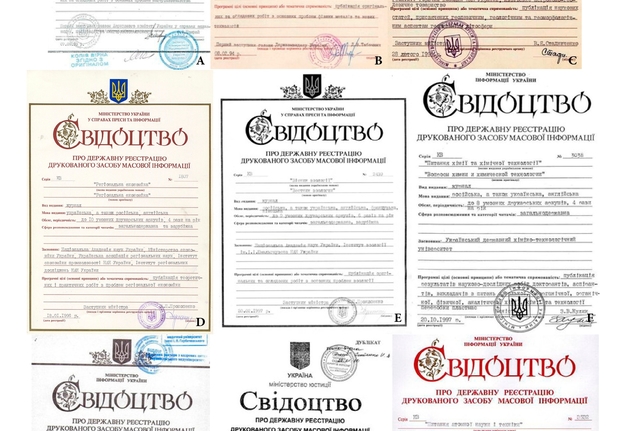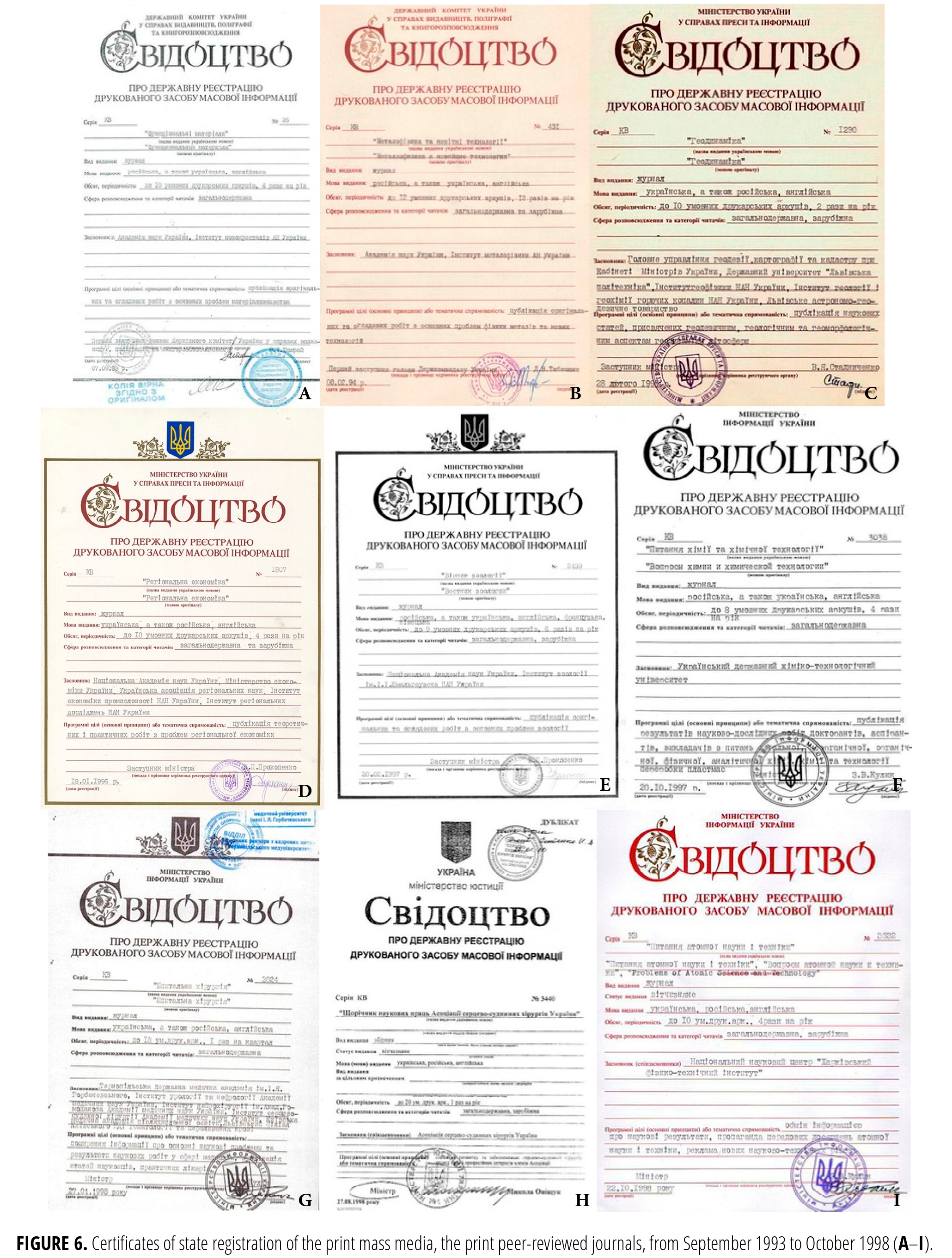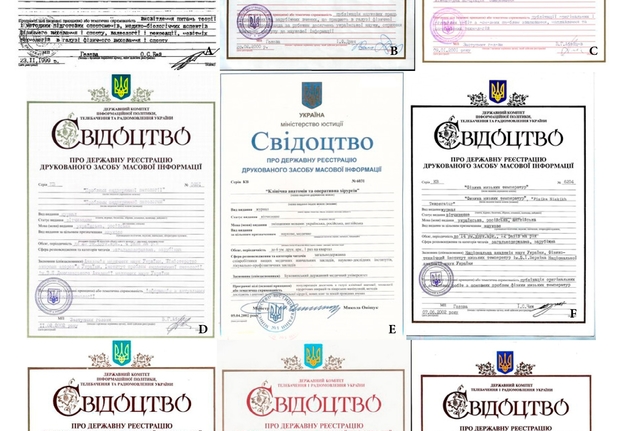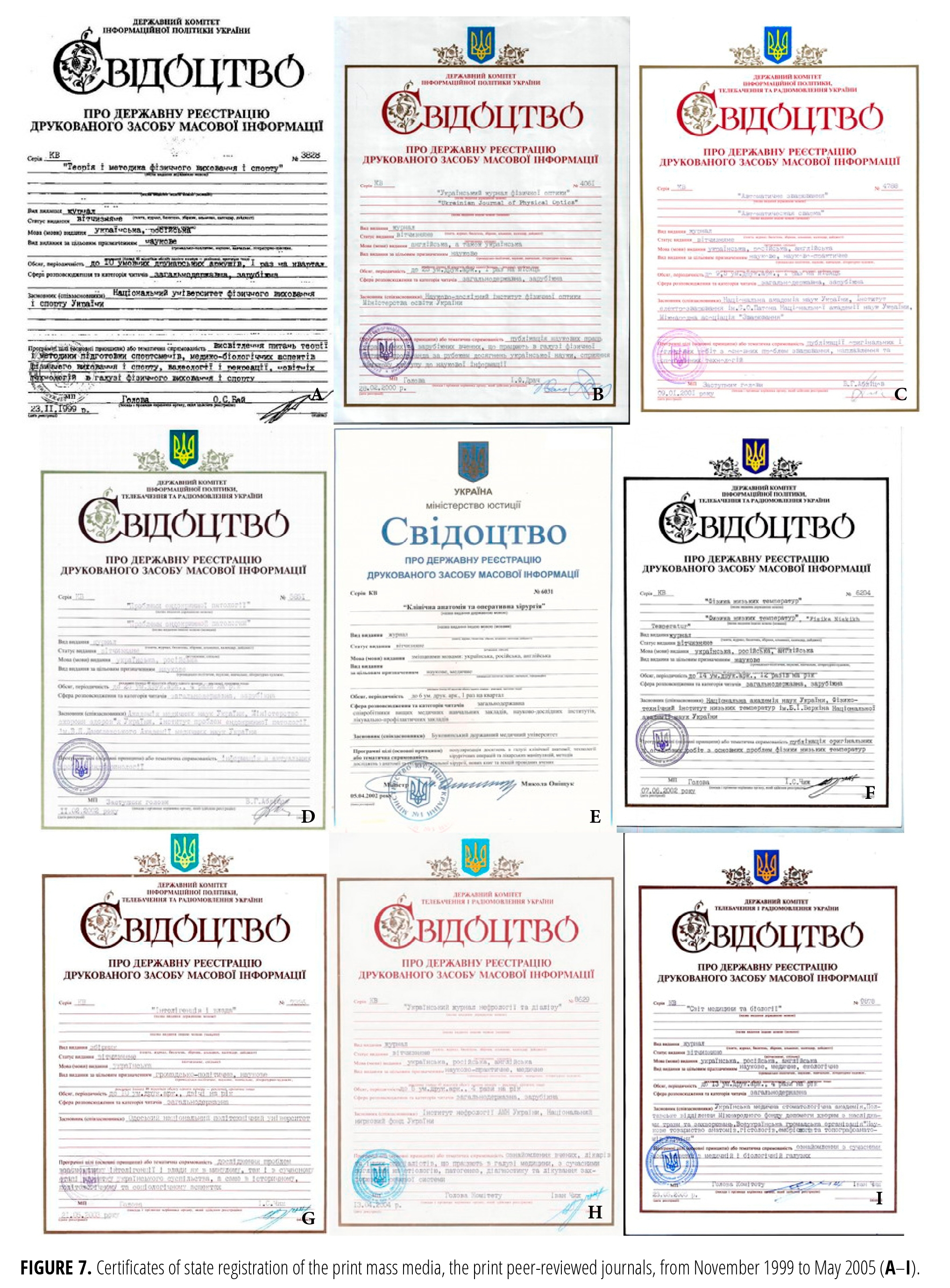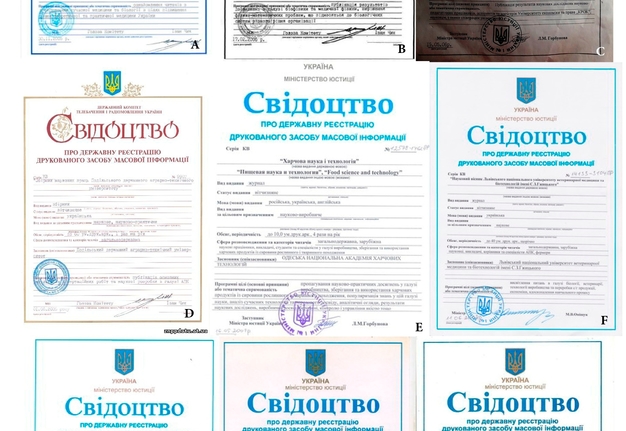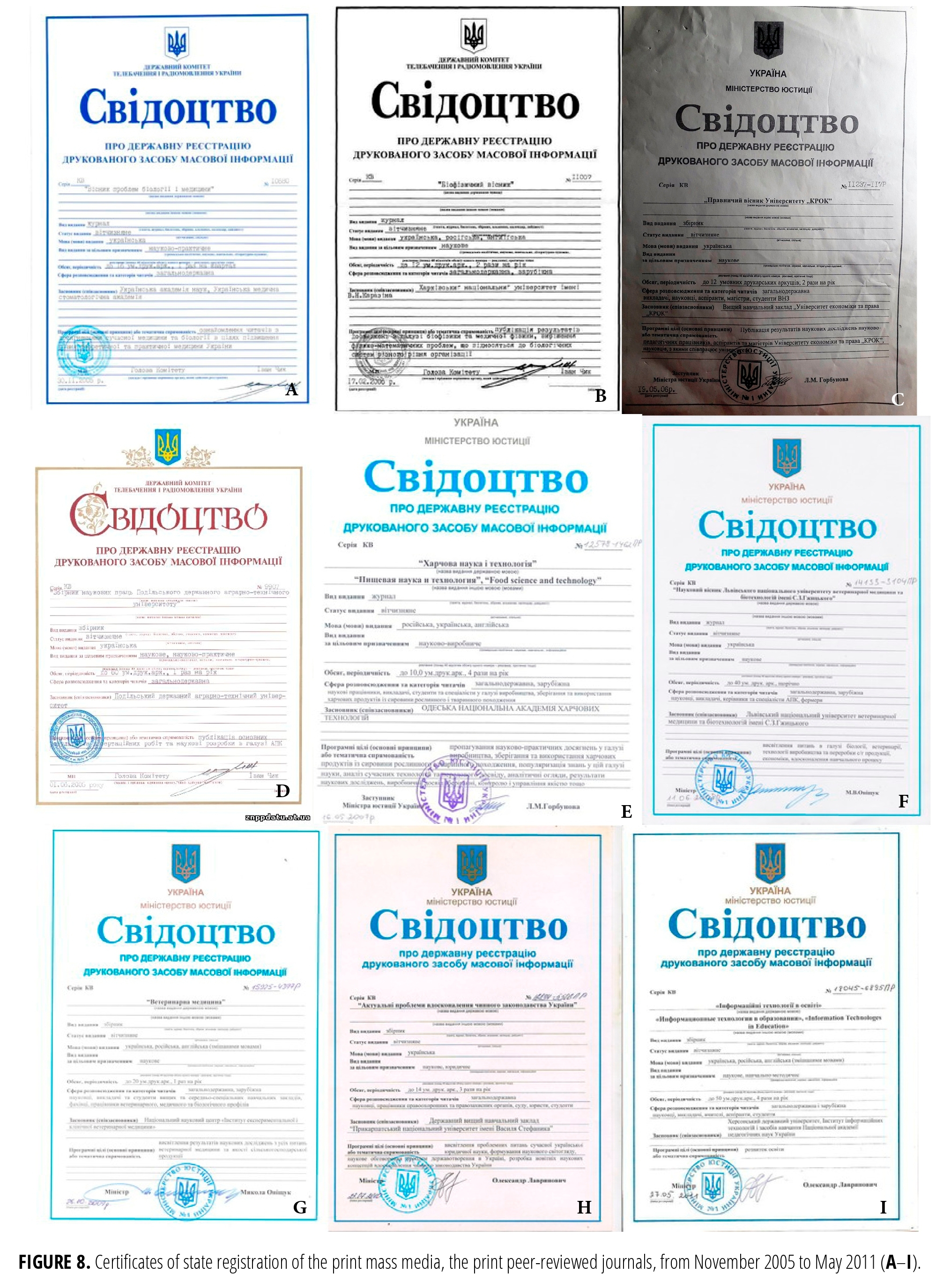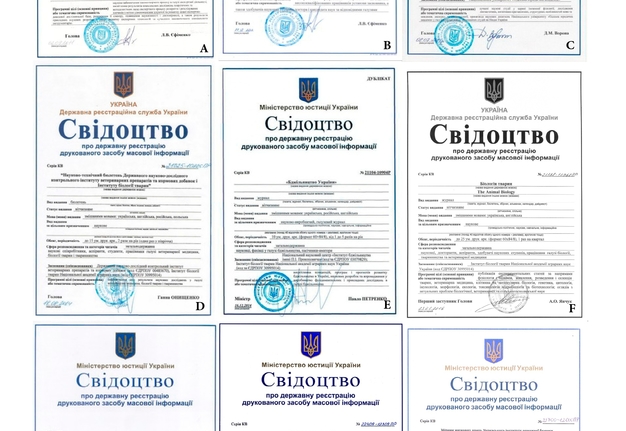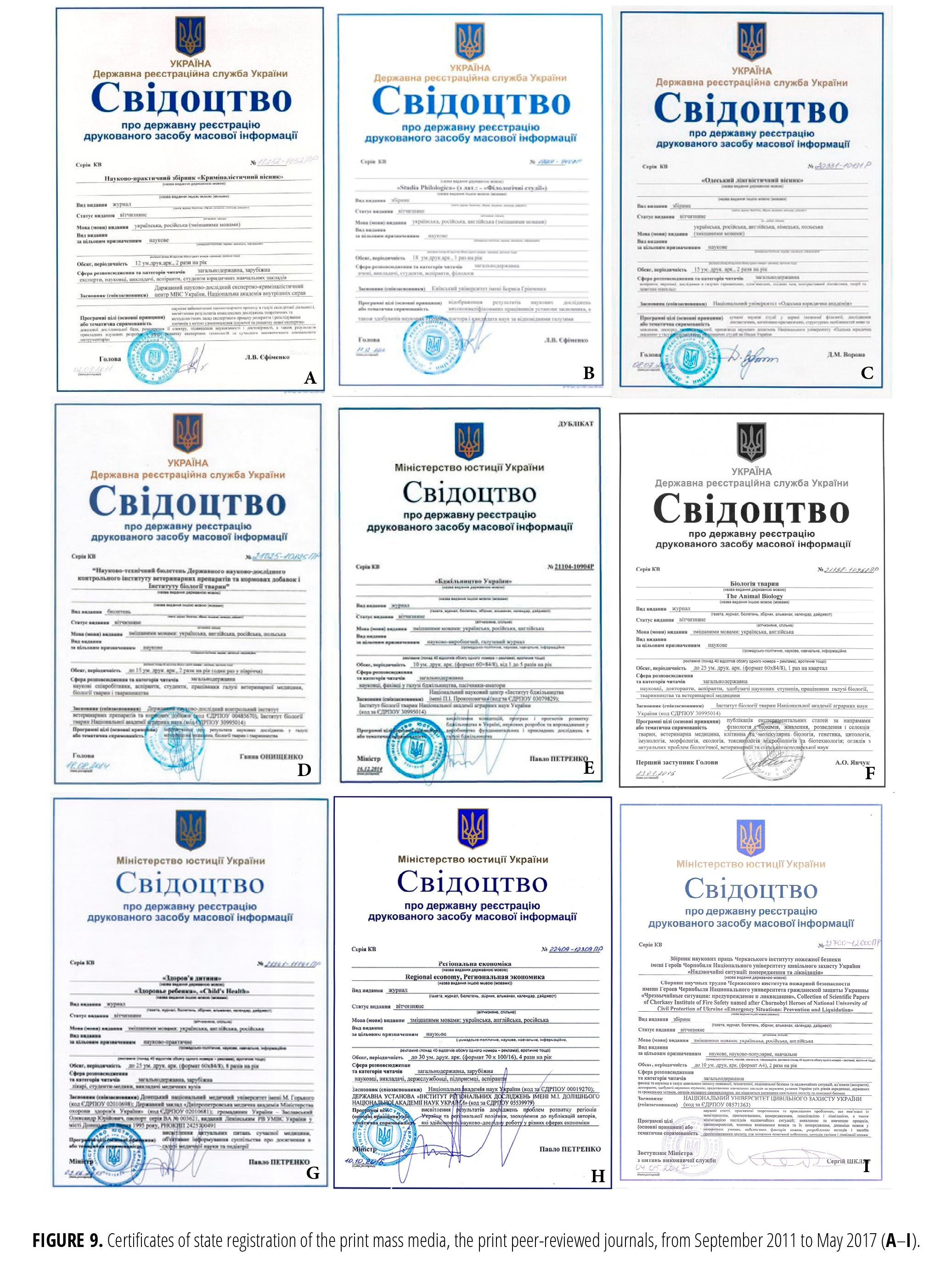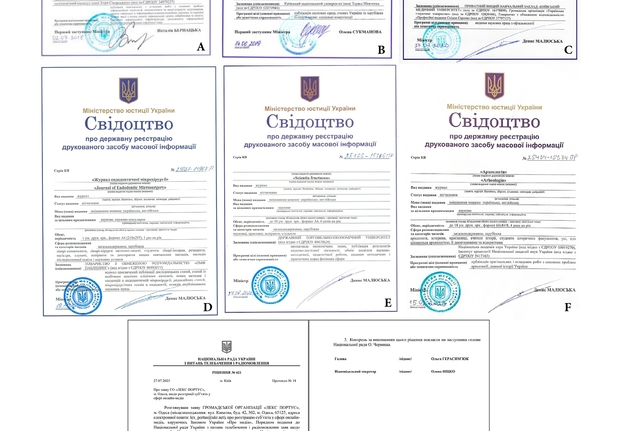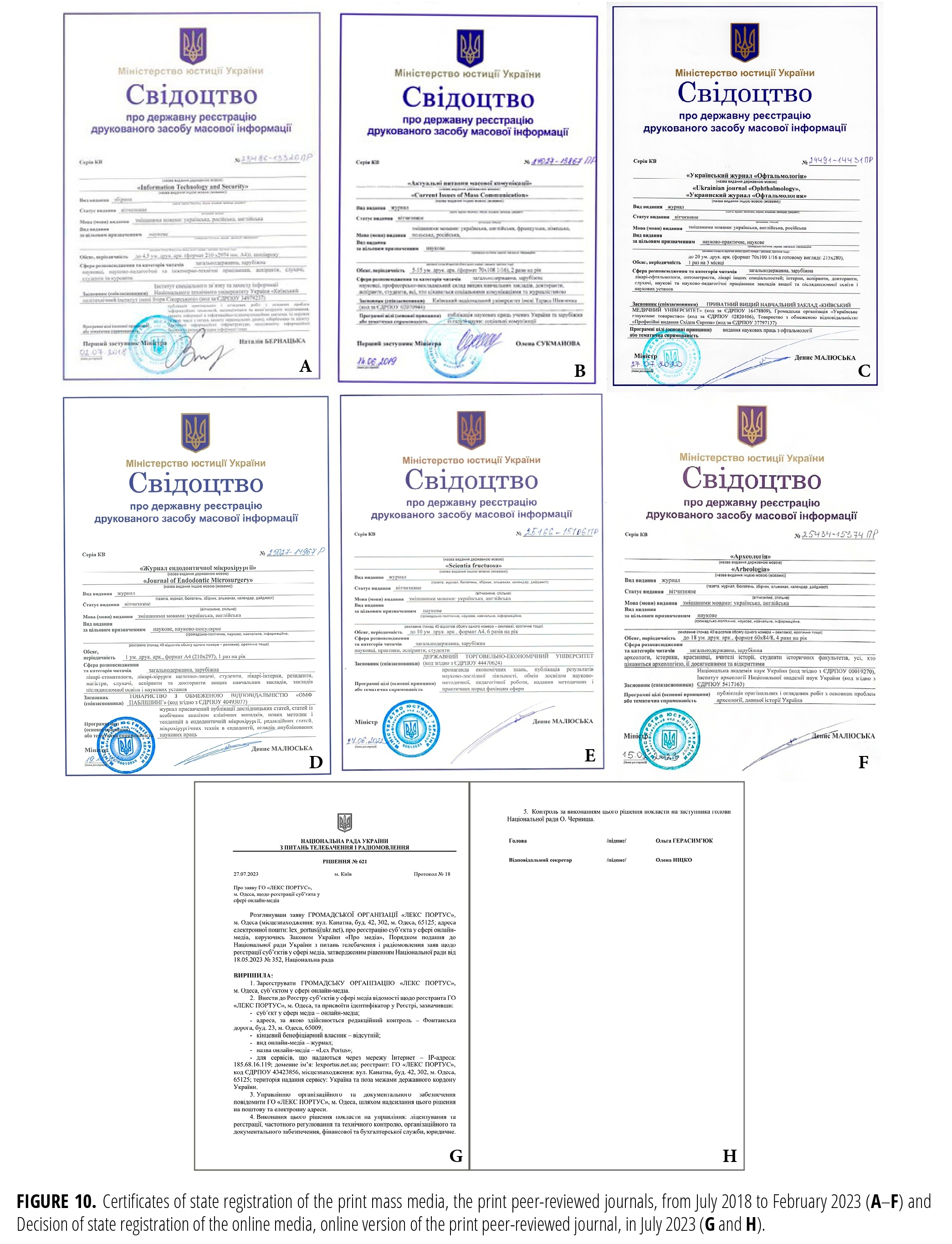The Journal of Diagnostics and Treatment of Oral and Maxillofacial Pathology and History of State Registration of the Peer-Reviewed Journals in Modern Ukraine: The Law of Ukraine “On Media”
December 31, 2023
J Diagn Treat Oral Maxillofac Pathol 2023;7: 145–164.
DOI: 10.23999/j.dtomp.2023.12.1
Under a Creative Commons license
HOW TO CITE THIS ARTICLE
Fesenko II. The Journal of Diagnostics and Treatment of Oral and Maxillofacial Pathology and history of state registration of the peer-reviewed journals in modern Ukraine: The Law of Ukraine “On Media”. J Diagn Treat Oral Maxillofac Pathol 2023;7(12):145–164. https://doi.org/10.23999/j.dtomp.2023.12.1
National Repository of Academic Texts
https://nrat.ukrintei.ua/en/searchdoc/2023U000249/
ABSTRACT. ABSTRACT IN UKRAINIAN (PDF).
Summing up the seventh year of publication of the Journal of Diagnostics and Treatment of Oral and Maxillofacial Pathology (JDTOMP), we would like to open the veil before readers and colleagues, which often covers many legislative and production processes in the existence of peer-reviewed journals published in Ukraine. In this article, not only our own path in registration and re-registration of the JDTOMP for 8 years, but also the state institutions which register journals from 1991, are analyzed. For this purpose, samples of issued certificates of state registration of print mass media, peer-reviewed journals, since August 24, 1991, to October 25, 2023 are pesented, and its analysis was conducted. The method of registration of exclusively electronic peer-reviewed journals (i.e., online-only journals) from August 24, 1991, to March 30, 2023, and from March 30, 2023 to nowadays was also analyzed. The following open access databases and lists were used for the analysis: (1) Ukrainian Scientific Periodicals (also known as the Register of Scientific Publications of Ukraine or the Register of Scientific Professional Publications of Ukraine) of the State Scientific Institution “Ukrainian Institute of Scientific and Technical Expertise and Information,” (2) Scientific Periodicals of Ukraine of the Vernadsky National Library of Ukraine, and (3) list of scientific professional publications and list of electronic scientific professional publications of Ukraine, in which the results of dissertations for obtaining the scientific degrees of Doctor of Science, Candidate of Science, and Doctor of Philosophy can be published dated October 25, 2023 (No. 1309). Based on the study of issued certificates of state registration of print mass media (namely, peer-reviewed journals), it was found that one of the first certificates was issued to the Functional Materials journal in 1993 by the State Committee of Ukraine on Affairs of Publishing Houses, Printing, and Book Distribution. The article presents Certificates and Decisions for all years issued by different state institutions from 1993 to 2023. Summarizing the review of the issued Certificates and Decisions on the registration of journals, it is worth noting that in the period from 1993 to 2023, the registration bodies that were given the function of state registration/re-registration of peer-reviewed journals changed at least 18 times. The important nuances of the Law of Ukraine “On Media,” adopted by the Verkhovna Rada on December 13, 2022, which replaced six outdated laws regulating the media sphere in Ukraine since the 1990s, are highlighted. The new procedure for registration/re-registration of peer-reviewed journals (as print and online media) in the National Council on Television and Radio Broadcasting of Ukraine starting from March 31, 2023, is described in detail. The recommendations that may be useful to other publishers and editorial teams of the peer-reviewed journals are provided.
KEY WORDS
Peer-reviewed journal; scientific professional publication; electronic scientific professional publication; serial periodical electronic publication; electronic analogue of the print publication; print journal; online-only journal; print media; online media
INTRODUCTION
The Law of Ukraine on Media will replace six outdated laws that have regulated the media sphere since the 1990s. Media legislation is one of the points that the European Union (EU), after approving Ukraine's candidate status in the EU, laid out in the road map for the start of negotiations on joining the EU.1
—Oleksandr Tkachenko
Minister of Culture and Information Policy of Ukraine
December 13, 2022
Since 2016, the Journal of Diagnostics and Treatment of Oral and Maxillofacial Pathology (JDTOMP) has undergone a number of transformations2–4 and continues to respond to a number of challenges.5–7 As our editorial and publishing team undergoes state registration/re-registration of the JDTOMP for the fourth time in connection with the adoption of the Law of Ukraine “On Media,” we would like to highlight this still unpublished history of our publication, which is already in its eighth year of existence.8 This article will present certificates of state registration of the JDTOMP, describe the procedure of registration of print and online peer-reviewed journals in modern Ukraine, i.e. for the period from August 24, 1991, to December 1, 2023. An analysis of the laws that regulated the establishment of print peer-reviewed journals, as well as the new law, the Law of Ukraine “On Media,” which clearly regulates the registration of print and online-only journals, will be carried out.
STATE REGISTRATION OF THE JDTOMP
The JDTOMP was launched in 2016 on the initiative of Kyiv community of oral and maxillofacial surgeons, with the assistance of Vice-Rector Natalia Savychuk, Rector Yurii Voronenko, and Rector Borys Ivnev. The purpose of creating the journal was the need to create the first professional scientific publication in Ukraine entirely devoted to all sections of oral and maxillofacial surgery. The co-founders of the publication became (1) the Shupyk National Medical Academy of Postgraduate Education, (2) the Private Higher Educational Establishment “Kyiv Medical University of UAFM,” and (3) OMF Publishing, LLC as a publishing company. The journal was registered in Ministry of Justice of Ukraine under the title Diagnostics and Treatment of Oral and Maxillofacial Pathology as a quarterly publication. The certificate of state registration was dated July 28, 2016 and was signed by Minister of Justice of Ukraine (Fig 1). The registered languages of the journal were English as the language of articles, and Ukrainian and Russian as the languages for abstracts/summaries.
FIGURE 1. Certificate of state registration of the print mass media (journal) in the Ministry of Justice of Ukraine as of July 28, 2016. The certificate was signed by Pavlo Petrenko, a Minister of Justice of Ukraine. The journal was registered under the title Diagnostics and Treatment of Oral and Maxillofacial Pathology.
The re-registration of the journal was carried out in 2019 in connection with (1) the legalization of the prefix (“Journal of”) in the title of the journal (Fig 2), (2) the increase in the frequency of publication of the journal issues, (3) the rejection of the Russian language in the abstracts/summaries of the articles, and (4) the change of the legal data of the two co-founders. The prefix “Journal of” clearly described the type of this periodical and was, in fact, de facto already used. The prefix emphasized that this periodical is a peer-reviewed journal and not a magazine, collection of scientific works or digest. So, the journal was registered in Ministry of Justice of Ukraine under the title Journal of Diagnostics and Treatment of Oral and Maxillofacial Pathology as a monthly publication. The certificate of state registration was dated May 21, 2019 and was signed by Minister of Justice of Ukraine (Fig 3). English and Ukrainian remained the only registered languages of the journal, English as the language for articles and Ukrainian as the language for abstracts/summaries. It is the combination of these two languages that became an important component of fulfilling the requirement of the Order No. 32 (dated January 15, 2018) of the Ministry of Education and Science of Ukraine for the assignment of scientific professional status to a journal, namely, to obtain category “A” or “B.” Sub-clause 4 of clause 6 of the Order No. 32 indicates that if the journal is not entirely in Ukrainian, each article in a non-Ukrainian language is accompanied by an abstract in Ukrainian with a volume of at least 1,800 signs, including keywords.
FIGURE 3. Certificate of state re-registration of the print mass media (journal) in the Ministry of Justice of Ukraine as of May 21, 2019. The certificate was signed by Pavlo Petrenko, a Minister of Justice of Ukraine. The journal was re-registered under the title Journal of Diagnostics and Treatment of Oral and Maxillofacial Pathology.
The next re-registration of the journal was carried out in 2021 due to the change of the legal name of the first co-founder. The certificate of state registration was dated August 10, 2021 and was signed by a First Deputy Minister of Justice of Ukraine (Fig 4). Table 1 summarizes all registration data upon all three registrations of the JDTOMP in the Ministry of Justice of Ukraine.
FIGURE 4. Certificate of state re-registration of the print mass media (journal) in the Ministry of Justice of Ukraine as of August 10, 2021. The certificate was signed by Yevhenii Horovets, a First Deputy Minister of Justice of Ukraine. The journal was re-registered under the title Journal of Diagnostics and Treatment of Oral and Maxillofacial Pathology.
As of December 2023, the co-founders, and the editorial staff of the JDTOMP are preparing documents (according to the Law of Ukraine “On Media”) for the re-registration of the journal as a print and online media in the National Council on Television and Radio Broadcasting of Ukraine.
Pursuant to Clause 21 of the Final and Transitional Provisions of the Law of Ukraine “On Media,” entities operating on the day of entry into force of the Law based on a certificate of registration of a print mass media (i.e., journal) must undergo registration within a year in compliance with the requirements of Article 63 of the new law. No fee is charged for such re-registration.8,9 After the expiration of the above-mentioned period, certificates of registration of print mass media issued before March 31, 2023, will become invalid.8 Certificates of registration are no longer issued, but the National Council on Television and Radio Broadcasting of Ukraine sends a Decision with a number and date.
Choosing the entity (i.e., subject) in the field of print and/or online media upon registration/re-registration of the journal in the National Council on Television and Radio Broadcasting of Ukraine
According to the Law of Ukraine “On Media,” only one legal entity or non-profit organization or individual should be the entity in the field of a print and/or online media, peer-reviewed journal. So, if the journal has more than one founder, then this requires an agreement between them as to who exactly will be indicated as an entity (i.e., subject) in the field of this media. Usually, the publisher who is responsible for the development of the journal, the creation and support of its media platform, the financing of the publication of the journal issues, and the profits and losses of the editorial office is indicated as such a founder. An example of this type is Lex Portus, a peer-reviewed journal, according to the certificate of state registration issued by the Ministry of Justice on June 16, 2020 (Fig 5A). It is indicated that the founders of the journal were the National University “Odessa Law Academy,” the public organization (i.e., non-profit organization) “Sea Association “Saint Mykolai” (non-governmental organization “Morska asotsiatsiia “Sviatyi Mykolai”), and the public organization “Lex Portus.” At the same time, the Decision on re-registration as a media dated July 27, 2023, indicates that the subject is only the public organization “Lex Portus” (Fig 5B), and it is indicated on the website of the journal (www.lexportus.net.ua) that the journal is published by the public organization “Lex Portus” in cooperation with the National University “Odessa Law Academy” (Fig 5C).10
FIGURE 5. Certificate of state registration of the print mass media, journal (Lex Portus), in the Ministry of Justice of Ukraine as of June 16, 2020 (A). The first page of the Decision of the National Council on Television and Radio Broadcasting of Ukraine on journal re-registration as a print media dated July 27, 2023 (B). Website (www.lexportus.net.ua) of the Lex Portus (C).
Very often, educational, and scientific institutions, as co-founders, provide the scientific support of the journal, and the publishing house finances the publication of the journal and the publication itself.
State fee for the re-registration or registration of the journal in the National Council on Television and Radio Broadcasting of Ukraine
The state fee for the registration of a print media (journal) (not paid in case of re-registration of print journal) or online media (journal) is UAH 2,684 (i.e., 62.81 Euro), and from January 1, 2024, it will be UAH 3,028 (i.e., 70.86 Euro).11 So, if the founders of the new peer-reviewed journal decide to register both the print and the online version, a total payment of UAH 6,056 (i.e., 141.71 Euro) will be required.11
LAWS AND REGISTRATION BODIES
Legislation from 1992 to 2023 and from 2023 to nowadays
-
Law of Ukraine “On Print Mass Media (Press) in Ukraine.” The law entered into force on the day of its publication – December 8, 1992. The law expired on December 13, 2022. The law does not apply from March 31, 2023. The law regulated the registration of print peer-reviewed journals.
-
The Law of Ukraine “On Media.” The law entered into force on March 31, 2023. The law regulates the registration of both print and online-only peer-reviewed journals.
In connection with the entry into force of the Law “On Media”, such laws as (1) “On Print Mass Media (Press) in Ukraine”, (2) “On Television and Radio Broadcasting”, (3) “On Information Agencies”, (4) “On the National Council of Ukraine on Television and radio broadcasting”, (5) “On the Procedure for Covering the Activities of State Authorities and Local Self-Government Bodies in Ukraine by Means of Mass Information”, and (6) “On the Protection of Public Morals” will cease to operate.12
How the print and online-only journals have been described and are described the laws of Ukraine
I. The Law of Ukraine “On Print Mass Media (Press) in Ukraine” (previous law governing peer-reviewed journals [this law expired on March 30, 2023]):
In accordance with the first part of Article 1 of the Law, the term print mass media (press) in Ukraine (e.g., print journal) is understood as periodical and continuing publications published under a permanent title, with frequency of one or more numbers (issues) during the year based on the state registration certificate.
II. The Law of Ukraine “On Media” (current law governing peer-reviewed journals from March 31, 2023)9:
-
print media (e.g., print journal) is media that distributes information in textual or visual form on print media, uniformly designed, published at certain intervals throughout the year – as the appropriate period approaches or as material accumulates.
-
online media (e.g., online version of the print journal or online-only journal) is a media that regularly distributes information in text, audio, audiovisual, or other forms in electronic (digital) form using the Internet on its own website, except for media classified by this Law as audiovisual media.
According to the Law of Ukraine “On Media,” the print and online media (in particular, print and online, and online-only peer-reviewed journals) are classified as non-audiovisual service providers.13
Thus, the establishment of a print journal in the period from 1992 to March 30, 2023, was possible only after state registration and obtaining a certificate. Below are listed all the state institutions that conducted the relevant registration and issued certificates. Samples of certificates and decisions for 31 years are presented in Figures 6–10.
The search for certificates for the specified years was conducted through such open access databases as: (1) Ukrainian Scientific Periodicals (also known as the Register of Scientific Publications of Ukraine or Register of Scientific Professional Publications of Ukraine) of the State Scientific Institution “Ukrainian Institute of Scientific and Technical Expertise and Information,” (2) Scientific Periodicals of Ukraine of the Vernadsky National Library of Ukraine, and (3) list of scientific professional publications of Ukraine and the list of electronic scientific professional publications of Ukraine, in which the results of dissertations for obtaining the scientific degrees of Doctor of Science, Candidate of Science, and Doctor of Philosophy can be published dated October 25, 2023 (No. 1309).14,15
Ukrainian registration bodies (state institutions) in chronological order, that registered and register peer-reviewed journals in modern Ukraine
-
In 1992, the State Press Committee of the Ukrainian Soviet Socialist Republic was liquidated, and the functions related to the implementation of the national policy in book publishing, registration of printed products, control over the execution of the state order for the publication of textbooks and other separate publications were transferred to the Ministry of Culture of Ukraine. Soon, in May 1993, these functions were taken away from the Ministry of Culture of Ukraine and transferred to the newly created State Committee of Ukraine for Affairs of Publishing, Printing and Book Distribution.16
-
State Committee of Ukraine for Affairs of Publishing, Printing, and Book Distribution (from 1993 to 1994) (Fig 6A–B).
-
Ministry for Affairs of Press and Information of Ukraine (from 1995 to 1997) (Fig 6C–E).
-
Ministry of Information of Ukraine (from 1997 to 1998) (Fig 6F–G).
-
Ministry of Justice of Ukraine (August 1998) (Fig 6H).
-
Ministry of Information of Ukraine (from 1998 to 1999) (Fig 6I).
-
State Committee for Information Policy of Ukraine (from 1999 to 2000) (Fig 7A–B).
-
State Committee for Information Policy, Television, and Radio Broadcasting of Ukraine (from 2001 to 2002) (Fig 7C–D).
-
Ministry of Justice of Ukraine (April 2002) (Fig 7E).
-
State Committee for Information Policy, Television and Radio Broadcasting of Ukraine (from 2002 to 2003) (Fig 7F–G).
-
State Committee of Television and Radio Broadcasting of Ukraine (from 2003 to 2006) (Figs 7H–I and 8A–B).
-
Ministry of Justice of Ukraine (May 2006) (Fig 8C).
-
State Committee of Television and Radio Broadcasting of Ukraine (June 2006) (Fig 8D).
-
Ministry of Justice of Ukraine (from 2006 to 2011) (Fig 8E–I).
-
State Registration Service of Ukraine (from 2011 to 2014) (Fig 9A–C).
-
Ministry of Justice of Ukraine (December 2014) (Fig 9E).
-
State Registration Service of Ukraine (January 2015) (Fig 9F).
-
Ministry of Justice of Ukraine (from 2015 to 2023) (Figs 9G–I and 10A–F).
-
National Council on Television and Radio Broadcasting of Ukraine (from March 31, 2023, till now) (Fig 10G–H).
Such numerous changes (namely 18 times) in registration institutions are primarily associated with the active period of state development and various forms of institutional reorganization.16
What is interesting, until March 31, 2023 (i.e., until the entry into force of the Law “On Media”), there were no requirements for state registration of online publications (i.e., online-only journals too) as mass media in modern Ukraine.17
In modern Ukraine, till March 30, 2023, to publish a print peer-reviewed journal with a simultaneous online version of the journal (i.e., electronic analogue of the print publication according to the Ukrainian State Standard 7157:2010 and 3017:2015),18,19 it was enough to go through state registration and obtain a Certificate of State Registration of Print Mass Media. After receiving the Certificate, the journal could already obtain an ISSN for each of the publication formats (i.e., ISSN [print] and ISSN [online]). In the JDTOMP, it is ISSN 2519-2086 (print) and ISSN 2522-1965 (online) respectively, which were obtained in 2016 and 2017.
With the transition from a print and online format of the journal to an exclusively online-only journal (i.e., serial periodical electronic publication according to the Ukrainian State Standard 7157:2010 and 3017:2015) until March 31, 2023, in Ukraine there was some legal uncertainty. But if the journal made the transition from the print and online versions to the online-only version, then in fact no authorized registration actions were required as the publication already had a Certificate of State Registration of Print Mass Media, and ISSN numbers had already been assigned. And every form of the online journal was essentially always with a print option, since each article and the issue itself had PDF files that could be printed as a copy of the journal for the conference if desired. Until March 31, 2023, the establishment, launch, and publication of an exclusively electronic edition of the peer-reviewed journal (i.e., online-only journal) was possible based on the recommendation of the Academic Council of the institution of higher education, scientific institution, non-profit organization (association/society) or company that launched the journal and the received protocol of the Academic Council/Supervisory Board Meeting or General Meetings of Members of the company. For example, the Journal of the Academy of Advocacy of Ukraine (an electronic peer-reviewed journal) is recommended by the Academic Council of the Academy of Advocacy of Ukraine for publication and distribution via the Internet (Protocol No. 5 dated March 4, 2008), the Law Forum (an electronic peer-reviewed journal) is recommended by the Academic Council of the Kharkiv National University of Internal Affairs for publication and distribution via the Internet, etc. In such cases, the electronic journal indicates that it is conformed to the National Standard of Ukraine (DSTU [in Ukrainian]) 7157:2010: Information and documentation; Electronic editions; Basic types and initial information.20
In some cases, the electornic peer-reviewed journal can be launched by the non-profit organization (i.e., non-governmental organization), like the Scientific Bulletin of International Association of Scientists. Series: Economy, Management, Security, Technologies, which was founded and published by International Association of Scientists.
Mandatory registration and re-registration of the print journals (i.e., print media)
Chapter IX of the Law of Ukraine “On Media” specifies that from the moment the Verkhovna Rada of Ukraine recognizes a certain state as an aggressor or occupying state and within five years from the date of the decision to cancel such status, print media (i.e., print peer-reviewed journals) are subject to mandatory registration.11 As of December 1, 2023, the Russian Federation is recognized by the Verkhovna Rada of Ukraine as an aggressor state and a terrorist state.
The lawyers are emphasizing, that print media that have already been registered with the Ministry of Justice of Ukraine and have a registration certificate must undergo re-registration by March 31, 2024.11 If this is not done, the certificate of registration of the print media will lose its validity.11 State payment will not be made for re-registration.11
Igor Rozkladai, an expert in media legislation, emphasizes that print and online media in peaceful life will have no obligation to register as media.13 But, what is important, the National Council on Television and Radio Broadcasting of Ukraine will have jurisdiction even if the media wasn’t registered.13 Article 116 of the Law of Ukraine “On Media” says that both registered and non-registered media could be punished by the National Council on Television and Radio Broadcasting of Ukraine with a fine or double fine.13 But in the case of registered media, the maximum sanction is a cancellation of registration, in the case of non-registered ones – prohibition of publication and distribution of the print media based on the court judgment.13
Voluntary registration of online journals (i.e., online media)
Registration of entities in the field of online media is voluntary and is carried out in accordance with the requirements of Law of Ukraine “On Media.”11
Summarising this study, it is nessesary to emphasize that the earliest certificate of state registration in modern Ukraine that we managed to find in open sources was the certificate issued in 1993 by the journal Functional Materials. The Functional Materials was registered for the first time in 1993 by the Academy of Sciences of Ukraine (currently known as the National Academy of Sciences of Ukraine) and Institute of Single Crystals of the Academy of Sciences of Ukraine (currently known as Institute of Single Crystals of the National Academy of Sciences of Ukraine).
And most importantly, the registration and re-registration of peer-reviewed journals in Ukraine did not stop even during the large-scale invasion of the occupying state (i.e., Russian Federation) on the territory of Ukraine. This is evidenced in particular by the certificates of state registration of mass media issued in June and December 2022 (in particular, Scientia Fructuosa and the Ukrainian Journal of Clinical Surgery).
In general, rethinking this analysis of the issued Certificates and Decisions on the registration of journals, it is worth noting that in the period from 1993 to 2023, the registration bodies that have been given the function of state registration/re-registration of peer-reviewed journals changed at least 18 times.
The Certificates, the Decisions, and Laws of Ukraine presented in this article have not only a legislative, publishing, and scientific significance that explains the mechanisms of registration of peer-reviewed journals in modern Ukraine, but also a historical importance that illuminates the processes of development scholar publishing of one of the European states.
CONCLUSIONS
State registration of the peer-reviewed journals in modern Ukraine has a rich history and, in 2023, the media legislation was synchronized with European Union requirements. It should be noted that from March 31, 2023, the National Council on Television and Radio Broadcasting of Ukraine will carry out registration of the print peer-reviewed journals as a print media, instead of the Ministry of Justice of Ukraine. Moreover, from this date, the online-only peer-reviewed journals can be registered as an online media.
Dura lex, sed lex [Latin].
The law is hard, but law.
A maxim of Roman civil law
CONFLICT OF INTEREST
The author declare that the research was conducted in the absence of any commercial or financial relationships that could be construed as a potential conflict of interest.
REFERENCES (20)
-
Ukrinform. The new law on media will replace six outdated laws in this area – Tkachenko (in Ukrainian) [internet]; Dec13, 2022 [cited 2023 Dec 1]. Available from: https://www.ukrinform.ua/rubric-society/3633667-novij-zakon-pro-media-zaminit-sist-zastarilih-zakoniv-u-cij-sferi-tkacenko.html
-
Tymofieiev OO, Fesenko II, Kilipiris EG. Evolving: becoming a printable digital-only journal from January 2022. J Diagn Treat Oral Maxillofac Pathol 2021;5(12):137–8. https://doi.org/10.23999/j.dtomp.2021.12.2
-
Fesenko II. Similar evolutionary steps: Journal of American College of Surgeons and Journal of Diagnostics and Treatment of Oral and Maxillofacial Pathology. J Diagn Treat Oral Maxillofac Pathol 2022;6(1):7–8. https://doi.org/10.23999/j.dtomp.2022.1.5
-
Tymofieiev OO, Fesenko II. “No abstract available.” Maybe it’s a time to integrate abstracts into editorials? J Diagn Treat Oral Maxillofac Pathol 2023;7(5):39–50. https://doi.org/10.23999/j.dtomp.2023.5.1
-
Fesenko II. Stop the war! Europeans, homes, kindergartens, hospitals, universities, and global science are under the missiles. J Diagn Treat Oral Maxillofac Pathol 2022;6(2):32–4. https://doi.org/10.23999/j.dtomp.2022.2.3
-
Tymofieiev OO, Fesenko II. Start of seventh volume in 2023 and analysis of publishing achievements of 2022. J Diagn Treat Oral Maxillofac Pathol 2023;7(1):1–2. https://doi.org/10.23999/j.dtomp.2023.1.1
-
Fesenko II. Penetrating trauma and facial fractures: topics that cannot be ignored during wartime, a new section editor. J Diagn Treat Oral Maxillofac Pathol 2023;7(10):115–119. https://doi.org/10.23999/j.dtomp.2023.10.1
-
The Law of Ukraine “On Media” has entered effect (in Ukrainian) [internet]; Mar 31, 2023 [cited 2023 Dec 2]. Available from: https://minjust.gov.ua/news/ministry/zakon-ukraini-pro-media-nabuv-chinnosti
-
The Law of Ukraine “On Media” (in Ukrainian) [internet]; Dec 13, 2022 [cited 2023 Dec 2]. Available from: https://zakon.rada.gov.ua/laws/show/2849-20#Text
-
Lex Portus [internet]; Dec 3, 2023 [cited 2023 Dec 3]. Available from: https://lexportus.net.ua/en/
-
Registration of print mass media (in Ukrainian) [internet]; Dec 2, 2023 [cited 2023 Dec 2]. Available from: https://justicon.ua/ua/service/registracia-smi.html
-
The Law “On Media” enters into force in Ukraine (in Ukrainian) [internet]; Mar 31, 2023 [cited 2023 Dec 3]. Available from: https://www.ukrinform.ua/rubric-society/3689787-v-ukraini-nabuvae-cinnosti-zakon-pro-media.html
-
Rozkladai I. Ukrainian media law: a reform that must be successful. Center for Democracy and Rule of Law. January 11, 2023. https://cedem.org.ua/en/analytics/ukrainian-media-law-a-reform/
-
Ministry of Education and Scince of Ukraine: scientific professional publications. List of scientific professional publications of Ukraine, in which the results of dissertations for obtaining the scientific degrees of Doctor of Science, Candidate of Science and Doctor of Philosophy can be published dated October 25, 2023 (No. 1309) (in Ukrainian) [internet]; Dec 4, 2023 [cited 2023 Dec 4]. Available from: https://mon.gov.ua/ua/nauka/nauka/atestaciya-kadriv-vishoyi-kvalifikaciyi/naukovi-fahovi-vidannya
-
Ministry of Education and Scince of Ukraine: scientific professional publications. List of electronic scientific professional publications of Ukraine, in which the results of dissertations for obtaining the scientific degrees of Doctor of Science, Candidate of Science and Doctor of Philosophy can be published dated October 25, 2023 (No. 1309) (in Ukrainian) [internet]; Dec 4, 2023 [cited 2023 Dec 4]. Available from: https://mon.gov.ua/ua/nauka/nauka/atestaciya-kadriv-vishoyi-kvalifikaciyi/naukovi-fahovi-vidannya
-
State Committee on Television and Radio Broadcasting of Ukraine: history of the creation and activity of the State Committee on Television and Radio Broadcasting of Ukraine (in Ukrainian) [internet]; Nov 28, 2023 [cited 2023 Nov 28]. Available from: https://comin.gov.ua/pro-nas/istoriya-derzhkomteleradio
-
Center for Democracy and Rule of Law (in Ukrainian) [internet]; Jan 25, 2019 [cited 2023 Dec 1]. Available from: https://cedem.org.ua/consultations/yak-zareyestruvaty-onlajn-zmi/#:~:text=В%20Україні%20немає%20жодних%20вимог,ідеальних%20умовах%20сприяти%20свободі%20слова.
-
National standard of Ukraine. Information and documentation. Electronic publications. Basic types and initial information. Ukrainian state standard 7157:2010. Kyiv: Derzhspozhyvstandart; 2010.
-
National standard of Ukraine. Information and documentation. Publications: basic types. Basic types: terms and definitions conceptions. Ukrainian state standard 3017:2015. Kyiv: DP UkrNDNTS; 2015.
-
Ivan Fedorov Book Chamber of Ukraine. List of current normative documents on standardization in the field of publishing: national standards of Ukraine (in Ukrainian) [internet]; Jul 17, 2023 [cited 2023 Dec 1]. Available from: http://www.ukrbook.net/vidavc.html
